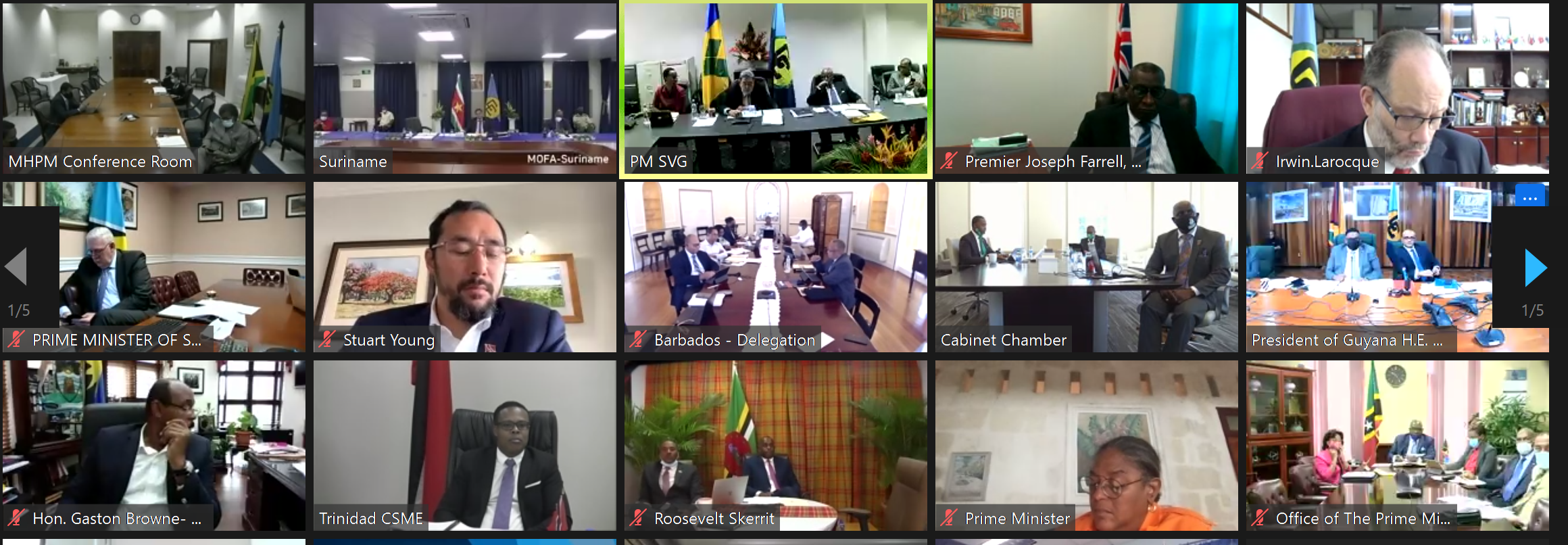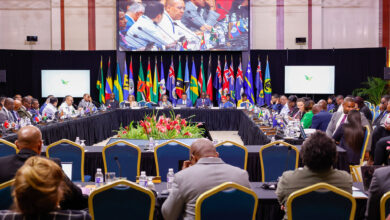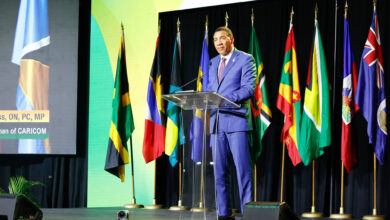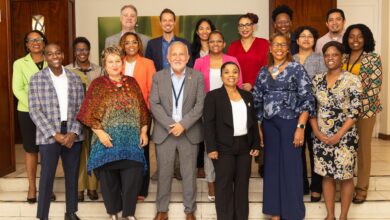The Forty-First Regular Meeting of the Conference of Heads of Government of the Caribbean Community (CARICOM) was held virtually on 29 October 2020. The Prime Minister of St. Vincent and the Grenadines, Dr. the Honourable Ralph Gonsalves, chaired the proceedings.
Other Members of the Conference in attendance were: Prime Minister of Antigua and Barbuda, Honourable Gaston Browne; Prime Minister of The Bahamas, Honourable Dr. Hubert Minnis; Prime Minister of Barbados, Honourable Mia Amor Mottley, Q.C, MP; Prime Minister of Dominica, Honourable Roosevelt Skerrit; Prime Minister of Grenada, Dr. the Rt. Honourable Keith Mitchell; President of Guyana, His Excellency Dr. Mohamed Irfaan Ali; President of Haiti, His Excellency Jovenel Moise; Prime Minister of Jamaica, the Most Honourable Andrew Holness; Premier of Montserrat, Honourable Easton Taylor-Farrell; Prime Minister of St. Kitts and Nevis, Dr. the Honourable Timothy Harris; Prime Minister of Saint Lucia, Honourable Allen Chastanet; the President of Suriname, His Excellency Chandrikapersad Santokhi; and Prime Minister of Trinidad and Tobago, Dr. the Honourable Keith Rowley.
Belize was represented by Attorney General, Honourable Michael Peyrefitte.
Associate Members in attendance were: Bermuda represented by Premier, the Honourable David Burt; the British Virgin Islands represented by Premier, the Honourable Andrew Fahie; and the Turks and Caicos Islands, represented by Premier, the Honourable Sharlene Cartwright-Robinson.
OPENING
Chair of the Community, Dr. the Honourable Ralph Gonsalves, Prime Minister of St. Vincent and the Grenadines, and the Secretary-General of the Community, Ambassador Irwin LaRocque, made brief opening remarks.
COVID-19 AND ITS IMPACT ON THE REGION
Heads of Government acknowledged the relative success of the Community in its fight against the multi-faceted challenges posed by the COVID-19 pandemic which they attributed to the application of functional cooperation, one of the core principles of regional integration and which was adopted from the outbreak of the Novel Coronavirus.
Heads of Government advocated continued vigilance and adherence to the regional public health approach being led by the Caribbean Public Health Agency (CARPHA). They commended CARPHA for its on-going leadership and technical support to Member States in responding to the COVID-19 pandemic. They also expressed appreciation for the assistance provided by International Development Partners.
Heads of Government recognised the impact of COVID-19 on several sectors, including health, tourism, education, security and law enforcement, as well as the different phases of the pandemic which individual countries may be experiencing.
Heads of Government also recognised that in the absence of a vaccine, COVID-19 will continue to be a grave public health, security and economic threat, and the regional approach must continue to be undertaken to manage these ongoing threats.
In that regard, they further recognised that re-opening and recovery require a careful balance between reducing restrictive measures and ensuring adequate actions to reduce importation and spread of new cases.
Heads of Government welcomed the COVAX Facility as an initiative to secure access to safe and effective COVID-19 vaccines that will afford countries the best opportunity to fast-track access to COVID-19 vaccines.
They also welcomed the fact that six CARICOM Member States have been identified for Advance Market Commitment – a financing instrument to support the procurement of vaccines for low and middle-income economies. They noted that the remaining Member States have committed to the COVAX Facility as self-financing countries, but were concerned at the limited criteria used to determine how countries accessed financing.
Heads of Government expressed deep concern that despite being in the midst of a global pandemic, the per capita income criterion was still being used to determine how countries accessed financing from the COVAX Facility.
Heads of Government expressed appreciation to the European Union, CARPHA and the Pan-American Health Organization (PAHO) for their support in facilitating the down payment for self-financing Member States.
They mandated CARPHA to explore, in collaboration with the CARICOM Secretariat and PAHO, other financing options to cover additional costs for the vaccines.
Heads of Government mandated CARPHA and the Chief Medical Officers of Member States to meet to refine the common technical standards for the CARICOM Travel Bubble and the entry of external arrivals, and report to the Secretariat within 48 hours.
CARIBBEAN ECONOMIC RECOVERY AND TRANSFORMATION
Heads of Government acknowledged that the COVID-19 pandemic exacerbated the development challenges already confronting the Community and that CARICOM States have been more deeply affected than other developing countries. Member States are now faced with a perfect storm of a public health crisis, an economic crisis and a deepening debt crisis.
Heads of Government agreed on the need to protect lives, while restoring livelihoods through policies and measures for the gradual and safe return to economic activity.
Heads of Government noted that the economic prospects for the Caribbean had worsened and cited a report by the International Monetary Fund that the Caribbean is the most affected globally by this pandemic, given that it is the most tourism and travel dependent Region in the world.
Heads of Government noted that the pandemic would also exacerbate already high deficits and debt in many countries in the Region and building back better would have significant capital requirements which required a multi-faceted financing plan.
In that regard, Heads of Government agreed to the concept of a Caribbean Economic Recovery and Transformation (CERT) Plan, which has been devised by a regional team of experts under the leadership of the Prime Minister of Barbados, Honourable Mia Amor Mottley.
Heads of Government called for a new Special Drawing Rights (SDR) allocation by the International Monetary Fund’s (IMF) as well as the refinancing of COVID-related debt into long-term low interest instruments. They also urged the early development and use of a Universal Vulnerability Index to determine countries’ eligibility for development assistance.
A JOINT TOURISM POLICY FOR CARICOM
Heads of Government noted that over the past seven (7) months, CARICOM Member States had seen an unprecedented decline in tourist arrivals brought on by the global COVID-19 pandemic.
Heads of Government further noted that several Member States were still recovering from the devastating hurricanes of 2017 and 2019, a situation further compounded by the effects of the pandemic.
Heads of Government recognised that the resulting reduction in tourism-related tax revenues and the implementation of needed COVID-19 containment, economic and social support mechanisms had placed unparalleled financial demands on Governments across the Community.
Heads of Government recognised the critical importance of rebuilding the tourism industry and, in that regard, welcomed a proposal by the Government of Saint Lucia for the preparation of a Joint Tourism Policy. They agreed to a Working Group to formulate the policy and report to the Conference by December 31, 2020.
Given the urgency of the matter, Heads of Government also agreed that a Prime Ministerial Sub-Committee (PMSC) on Tourism be established to provide political oversight for the preparation of the Joint Tourism Policy and other related issues. The Prime Minister of The Bahamas, as the Lead Head of Government for Tourism in the CARICOM Quasi Cabinet, will preside over the Sub-Committee which will include Antigua and Barbuda, Barbados, Jamaica and Saint Lucia.
BLACKLISTING
Heads of Government observed that the European Union, through the actions of the Council and the Commission, have stepped up the economic assault on Small States despite the prevailing global pandemic which has forced the protracted shutdown of economic activity amidst predictions of a slower recovery than envisaged.
Heads of Government condemned in the strongest possible terms the continued blacklisting by the European Union of Members of the Community through unilaterally and arbitrarily determined standards, and in the absence of any meaningful prior consultation with the affected Members.
Heads of Government noted that the European Union has steadfastly ignored that capacity constraints and other challenges at the national level continue to impact the speed and depth of reforms in tax administrations, and financial intelligence units in Member States.
Heads of Government stated that this disproportionate treatment of CARICOM States is a breach of the rights of CARICOM citizens, and called upon the European Council and European Commission to desist from this egregious practice.
CARICOM PRIVATE SECTOR ORGANISATION (CPSO)
Heads of Government agreed to designate the CARICOM Private Sector Organisation (CPSO) as an Associate Institution of the Community.
They also agreed to a Memorandum of Understanding between the Caribbean Community and the CPSO Inc. for cooperation towards the further implementation of the CARICOM Single Market and Economy (CSME).
BORDER ISSUES
Belize-Guatemala Relations
Heads of Government received an update on the most recent developments on the Belize – Guatemala border issue. They noted the extension of the time limits for the submission of the Memorials and the Counter Memorials to the International Court of Justice by Belize and Guatemala, respectively. Heads of Government urged Belize, Guatemala and the OAS to continue implementing fully the Confidence Building Measures that have been in place since 2005, pending the resolution of Guatemala’s claim at the International Court of Justice (ICJ).
Heads of Government noted that the undertaking by both countries and the Organisation of American States (OAS) to engage in the design and development of a mechanism of co-operation for the Sarstoon River is still outstanding, and called on both countries and the OAS to reinvigorate their efforts to this end.
They also expressed support for the significant role of the OAS in the process aimed at resolving the dispute arising from Guatemala’s claims on Belize, and further called on the international community to continue supporting the OAS Office in the Adjacency Zone.
Heads of Government re-emphasised their steadfast support for the sovereignty, territorial integrity and security of Belize.
Guyana-Venezuela Border Controversy
Heads of Government noted that the ICJ held an Oral Hearing on Jurisdiction by ‘virtual’ process in the Case of Guyana v. Venezuela on 30 June 2020. A decision is awaited. If the Court affirms its jurisdiction, Guyana will proceed to the next stage of its pleadings as to why the 1899 Arbitral Award is the valid demarcation of the boundary between Guyana and Venezuela, thus providing for a final resolution of the controversy between the two countries as determined by the Secretary General of the United Nations.
Heads of Government reiterated their full support for this judicial process that is intended to bring a peaceful and definitive end to the long-standing controversy between Guyana and Venezuela.
Heads of Government further reiterated their firm and unswerving support for the maintenance and preservation of the sovereignty, and territorial integrity of Guyana.
EXCHANGE OF VIEWS WITH THE UN SECRETARY-GENERAL
Heads of Government engaged with the UN Secretary-General as their Special Guest. They held an extensive and fruitful exchange of views on issues related to the devastating impact of the COVID-19 pandemic on the Region’s economy, which has exacerbated existing vulnerabilities, in particular, those related to high levels of debt and access to concessional financing. With regard to climate change, the Secretary-General commended the Community for its efforts to become the first climate-resilient Region.
He also noted the similarity of views on climate change and recovery to the pandemic which were linked through their solutions. Recovery from the COVID-19 crisis, achieving the Sustainable Development Goals (SDGs) and securing climate action are not separate efforts, he stated. He affirmed the United Nations’ support for a multi-dimensional vulnerability index to help in determining access to concessional financing.
Heads of Government welcomed the Secretary General’s firm support for the need for urgent debt relief for middle-income developing countries, and for the importance of the recourse to the criterion of vulnerability as opposed to GDP in measuring development. They recognised that the upcoming meeting of UNCTAD XV, to be held in Barbados in April 2021, would provide an opportunity to discuss a more equitable multilateral trading system.
DATE AND VENUE THIRTY-SECOND INTER-SESSIONAL MEETING OF THE CONFERENCE
The Government of Trinidad and Tobago will host the Thirty-Second Intersessional Meeting of the Conference, to be held on 23-24 February 2021.






